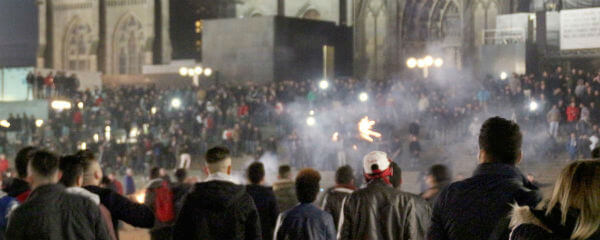
Der Spiegel reports: A lot happened on New Year’s Eve in Cologne, much of it contradictory, much of it real, much of it imagined. Some was happenstance, some was exaggerated and much of it was horrifying. In its entirety, the events of Cologne on New Year’s Eve and in the days that followed adhered to a script that many had feared would come true even before it actually did. The fears of both immigration supporters and virulent xenophobes came true. The fears of Pegida people and refugee helpers; the fears of unknown women and of Chancellor Angela Merkel. Even Donald Trump, the brash Republican presidential candidate in the US, felt it necessary to comment. Germany, he trumpeted, “is going through massive attacks to its people by the migrants allowed to enter the country.”
For some, the events finally bring to light what they have always been saying: that too many foreigners in the country bring too many problems along with them. For the others, that which happened is what they have been afraid of from the very beginning: that ugly images of ugly behavior by migrants would endanger what has been a generally positive mood in Germany with respect to the refugees.
As inexact and unclear as the facts from Cologne may be, they carry a clear message: Difficult days are ahead. And they beg a couple of clear questions: Is Germany really sure that it can handle the influx of refugees? And: Does Germany really have the courage and the desire to become the country in Europe with the greatest number of immigrants?
The first week of 2016 was a hectic one. Tempers flared and hysteria spread. It should be noted that an attack would have triggered similar national emotions, or the murder of a child in a park or any other crime that touched on our deepest fears and serviced our long-held stereotypes — any crime in which a foreigner was involved. On New Year’s Eve in Cologne, it was — according to numerous witness reports — drunk young men from North Africa who formed gangs to go after defenseless individuals. They humiliated and robbed — and they sexually assaulted women.
Their behavior, and the subsequent discussion of their behavior in the halls of political power in Berlin, in the media and on the Internet, could easily trigger a radical shift in Germany’s refugee and immigration policies. The pressure built up by the images and stories from Cologne make it virtually impossible to continue on as before. That, too, is a paradox: The pressure would be no less intense even if not a single one of the refugees and migrants who arrived in 2015 were among the perpetrators. [Continue reading…]
CNN reports: German authorities have identified 31 people, including 18 asylum-seekers, as suspects in mob sex attacks and muggings in Cologne on New Year’s Eve — one of several such incidents in Europe.
In Cologne, where most of the attacks took place, a police spokesman confirmed Chief Wolfgang Albers was fired Friday. Albers’ dismissal comes amid criticism of his department’s handling of the violence.
One victim of the Cologne violence told CNN there were too few police on the streets to prevent attacks.
“We ran to the police. But we saw the police were so understaffed,” the victim said. “They couldn’t take care of us and we as women suffered the price.”
Spiegel Online reported that groups of men prevented officers from reaching those crying out for help.
Interior Minister Thomas de Maiziere has slammed the response of Cologne police while German Justice Minister Heiko Maas was among many who blasted Cologne Mayor Henriette Reker for advising women to keep “more than an arm’s length” from unknown men.
Reker later complained the comments were taken out of context.
Cologne police spokeswoman Christoph Gilles told reporters Friday that some 170 criminal complaints have been filed related to the apparently coordinated attacks, “at least 120 of which have a sexual angle.”
An 80-person investigative team is looking at 250 videos (with about 350 hours of footage), Gilles added.
The suspects include nine Algerian nationals, eight people from Morocco, five from Iran and four from Syria, German interior ministry spokesman Tobias Plate said. Two are German citizens, while one each are from Iraq, Serbia and the United States.
Other German cities had similar attacks that same night, including the northern city of Hamburg, where more than 50 similar incidents were reported. Other European cities also reported attacks.
Six women in Zurich, Switzerland, told authorities they were “robbed from one side, [while] being groped … on the other side” by groups of men described as having dark skin, according to a Zurich police statement released Friday.
And in Helsinki, Finland, police said they are investigating two possible criminal offenses related to New Year’s Eve harassment centered around “a gathering of asylum-seekers.”
Both the Zurich and Helsinki allegations became public well after the incidents took place. [Continue reading…]
As well as the fact that there were significant delays in the reporting of many of these events, another element of the story has as far as I’m aware received virtually no attention: the fact that at the very time these assaults were taking place, every major city in Europe (and much of the rest of the world) was under heightened security because of the anticipated risk of an attack by ISIS.
It’s as though security services in their hypervigilance watching out for masked men brandishing AK-47s and wearing suicide belts, regarded drunken mayhem and mob violence as a distraction. By being geared towards dealing with atrocities, the task of handling law and order got downgraded. The all-important preemptive police-work of keeping the peace, failed.

